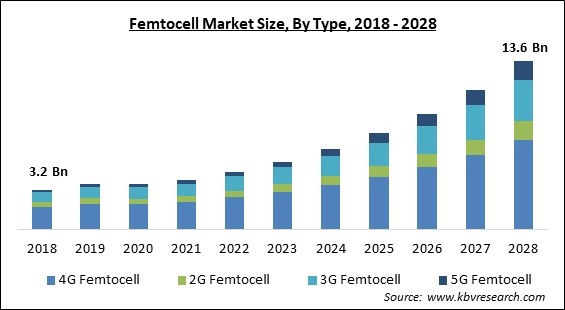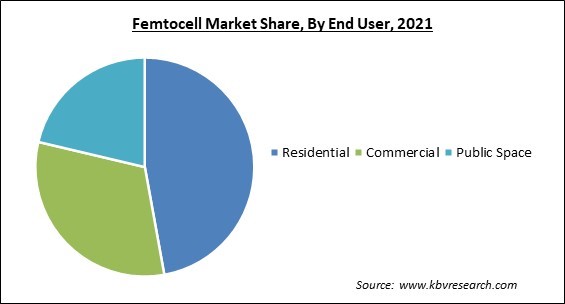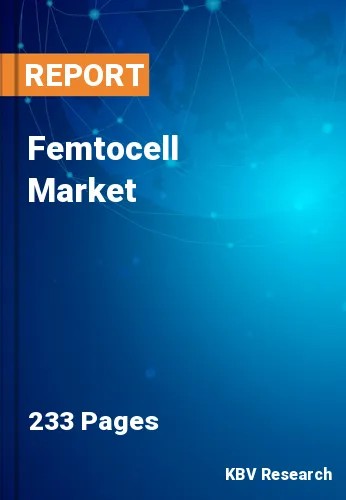The Global Femtocell Market size is expected to reach $13.6 billion by 2028, rising at a market growth of 19.6% CAGR during the forecast period.
A femtocell is a compact, fully functional cellular base station. A typical internet and cable service keep a femtocell always connected to a network of a mobile number service provider. Femtocells, which are compact, can take the role of Wi-Fi routers. They are mostly intended for residential or commercial buildings. Home femtocells can allow up to four connections, whereas commercial femtocells can support up to 16 connections. High-speed internet can be used with this economical solution.

The requirement to guarantee that femtocell service providers have the capacity and competence to supply data service with excellent performance amid the rise in traffic demand is becoming more and more important. As a result, service providers investing significantly in the femtocell industry in a variety of use cases including local mobile phone network operators as well as the data service provider. Femtocells also assist organizations in managing the ongoing pandemic and continuing to run profitable enterprises.
The market is growing as a result of a number of factors, including the femtocell's low cost and low power consumption and the rise in commercial demand for wireless networks brought on by the digitization of industries. Additionally, the expansion of the market is being driven internationally by an increase in smartphone and wearable device usage. Furthermore, a significant femtocell business opportunity is projected due to the rise in demand for 5G networks and low latency high-speed internet.
The COVID-19 pandemic has had a favourable effect on the femtocell market's expansion since femtocell technologies assist businesses in meeting the high capacity requirement of internet traffic. The majority of internet and data service providers have noticed an increase in worldwide internet traffic of between 30 and 45 percent over the past year. The COVID-19 pandemic is predicted to accelerate the adoption of industrial automation across a range of business verticals, including manufacturing, e-commerce, and transportation and logistics, which is predicted to increase demand for femtocells for Internet of Things (IoT) connectivity.
Installing a femtocell is essential to meeting the growing need for high-speed wireless networks because it ensures dramatically improved data rates from Mbps to Gbps—and ultra-reliable decreased latency—from tens of milliseconds to milliseconds. Additionally, it is a low-power gadget. Network densification, which is expanding available network capacity by adding more femtocells, is a key factor in the success of femtocell deployment.
An enormous increase in data traffic has been caused by the growing use of smartphones. To meet the needs of customers in various regions, mobile network operators are providing high-quality network services at competitive prices. The signal to interference plus noise ratio (SINR), which affects system capacity, rises as the distance between a receiver and a transmitter decrease. System capacity can be boosted by using femtocells to reduce cell size.
Mobile customers in both private and public spaces have welcomed femtocells as a way to enhance network quality and deliver faster data speeds. However, as Wi-Fi can offload data traffic considerably better than femtocells, they are up against fierce competition from this technology. Additionally, Wi-Fi has a number of benefits over femtocells, including spectrum independence, extensive indoor coverage, interference cancellation, high power levels, as well as high data transmission.
On the basis type, the femtocell market is fragmented into 2G femtocell, 3G femtocell, 4G femtocell and 5G femtocell. The 5G femtocell covered a substantial revenue share in the femtocell market in 2021. The growth in this segment is the result of the emergence of 5G technology and the development of low latency networking technology, which will offer inexpensive, high-speed internet with a data speed of 1 Gbps.

Based on end-user, the femtocell market is classified into residential, commercial, and pubic space. In 2021, the residential segment registered the maximum revenue share in the femtocell market. The huge demand for wireless internet access in apartment buildings is responsible for this. Network coverage is made possible by the employment of femtocells in areas where the signal strength to the main network cells may be insufficient.
By application, the femtocell market is divided into indoor and outdoor. The outdoor segment garnered a significant revenue share in the femtocell market in 2021. This is because outdoor femtocells allow commercial end users to concentrate on their main tasks, such as providing high-speed internet for densely populated areas like stadiums and street paths and protecting against network jamming incidents. These factors significantly contribute to the expansion of the femtocell market in the upcoming years.
Based on technology, the femtocell market is segmented into IU-H and IMS/SIP. In 2021, the IMS/SIP segment dominated the femtocell market by generating largest revenue share. The 3rd Generation Partnership Project (3GPP) envisions a converged telecommunications architecture called the IP Multimedia Subsystem (IMS) that combines cellular & internet technologies to universally provide voice, video, and data on a single network.
| Report Attribute | Details |
|---|---|
| Market size value in 2021 | USD 4 Billion |
| Market size forecast in 2028 | USD 13.6 Billion |
| Base Year | 2021 |
| Historical Period | 2018 to 2020 |
| Forecast Period | 2022 to 2028 |
| Revenue Growth Rate | CAGR of 19.6% from 2022 to 2028 |
| Number of Pages | 233 |
| Number of Tables | 430 |
| Report coverage | Market Trends, Revenue Estimation and Forecast, Segmentation Analysis, Regional and Country Breakdown, Companies Strategic Developments, Company Profiling |
| Segments covered | Type, Technology, Application, End User, Region |
| Country scope | US, Canada, Mexico, Germany, UK, France, Russia, Spain, Italy, China, Japan, India, South Korea, Singapore, Malaysia, Brazil, Argentina, UAE, Saudi Arabia, South Africa, Nigeria |
| Growth Drivers |
|
| Restraints |
|
Region wise, the femtocell market is analyzed across the North America, Europe, Asia Pacific and LAMEA. In 2021, the North America segment led the femtocell market with the largest revenue share. This is due to the telecommunications industry's rapid expansion, the implementation of 5G, and the surge in demand for internet provider equipment that can sustain high internet traffic. The regional femtocell market is expanding as a result of the wide adoption of femtocell in the small-sized enterprises of the region.
Free Valuable Insights: Global Femtocell Market size to reach USD 13.6 Billion by 2028
The market research report covers the analysis of key stake holders of the market. Key companies profiled in the report include Samsung Electronics Co., Ltd. (Samsung Group), Cisco System, Inc., Ericsson AB, Fujitsu Limited, Analog Devices, Inc., Huawei Technologies Co., Ltd. (Huawei Investment & Holding Co., Ltd.), Nokia Corporation, ZTE Corporation, Motorola Solutions, Inc. and Vodafone Group Plc.
By Type
By End User
By Application
By Technology
By Geography
The global Femtocell Market size is expected to reach $13.6 billion by 2028.
High Demand for Wireless Networks are driving the market in coming years, however, Ongoing Competition with Wi-Fi restraints the growth of the market.
Samsung Electronics Co., Ltd. (Samsung Group), Cisco System, Inc., Ericsson AB, Fujitsu Limited, Analog Devices, Inc., Huawei Technologies Co., Ltd. (Huawei Investment & Holding Co., Ltd.), Nokia Corporation, ZTE Corporation, Motorola Solutions, Inc. and Vodafone Group Plc.
The Indoor market has acquired maximum revenue in Global Femtocell Market by Application in 2021; thereby, achieving a market value of $9.3 billion by 2028.
The 4G Femtocell market is leading the Global Femtocell Market by Type in 2021; thereby, achieving a market value of $7.2 billion by 2028.
Our team of dedicated experts can provide you with attractive expansion opportunities for your business.

